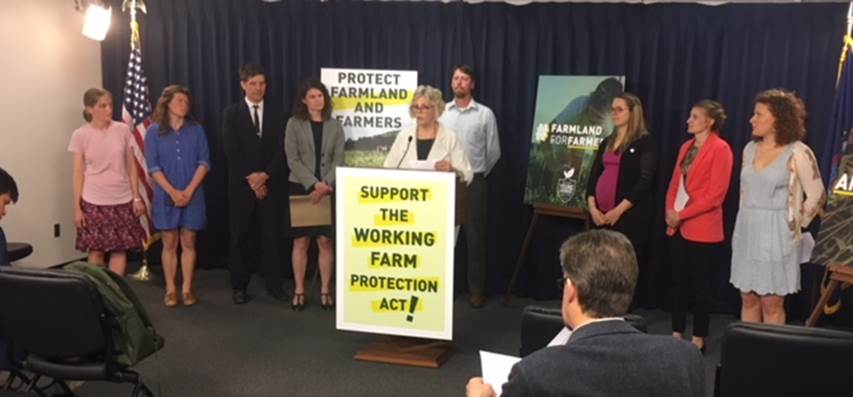Assemblymember Barrett Introduces the Working Farm Protection Act to Make Farmland More Accessible to Working Farmers
Bill A.10301A would strengthen New York’s farmland protection program by funding conservation easements that protect the affordability of land for working farmers
Assemblymember Didi Barrett (D-Columbia, Dutchess) was joined in Albany today by The National Young Farmers Coalition, New York Farm Bureau, American Farmland Trust, Scenic Hudson, local farmers and land trusts from around the state to take a stand for farmers with the introduction of the Working Farm Protection Act. The Act would strengthen the State’s Farmland Protection Implementation Grant Program by funding conservation easements that make farmland permanently affordable to working farmers.
“Agriculture has seen a rebirth in the Hudson Valley and New York farms are increasingly feeding our families and stocking our farmers markets and restaurants,” said Assemblymember Barrett. “I have introduced The Working Farm Protection Act, A10301A, to strengthen the existing Farmland Protection Grant Program and help make farmland more accessible to young farmers. I am also pleased to announce that Senator Patty Ritchie (R- Jefferson, Oswego, St. Lawrence), Chair of the State Senate Agriculture Committee, will carry the bill in the Senate. With this bipartisan effort, I am hopeful that we can provide a permanent path to farm ownership for our young farmers during this legislative session.”
The Working Farm Protection Act comes at a critical time as farmland values are on the rise and New York’s agricultural land is being lost to non-farmer owners. According to USDA data, average New York farm real estate prices rose by 124 percent between 1997 and 2016. Non-farmer interest in farmland not only impacts real estate prices, but, according to American Farmland Trust, has also resulted in an estimated loss of three farms per week over the last thirty years.
“Farmland ownership is the foundation of a successful farm,” said Lindsey Lusher Shute, Executive Director of the National Young Farmers Coalition and co-owner of Hearty Roots Community Farm in Clermont, “but in today’s real estate market, selling vegetables or raising livestock doesn’t pay the mortgage. If we want working farms in this state, we must take action to ensure that the price of protected farmland is affordable to the farmers who need it. Without addressing farmland affordability and the needs of the farmers working the land, the farmland protection program will not fully realize its intended purpose. As non-farmers buy these parcels and bid up the price for land, the farmers will leave and our farm communities will be lost.”
While traditional agricultural easements successfully protect farmland from development and are an important financial tool for established farmers, easements funded under this bill would also ensure that future farmers can own and operate conserved land by keeping it affordable at the time of sale. Unlike traditional easements, where land can be sold to a non-farmer, easements promoted by the Working Farm Protection Act would require farmers to sell their farm to another working famer. These voluntary easements have been the key to transitioning hundreds of farmers in Massachusetts and Vermont, and are being used by an increasing number of New York land trusts.
Peter Paden, Executive Director of Columbia Land Conservancy, said, “The Columbia Land Conservancy uses a variety of different tools and techniques to help farmers gain long term and secure access to farmland. As land prices in our region continue to rise, we believe the Preemptive Purchase Right will become one of several critically important mechanisms we can use to help ensure that our best and most productive farmland remains affordable for the farmers who need it. We are grateful for the leadership of Didi Barrett in bringing forth this bill, and hope others will support this important effort.”
David Fisher, New York Farm Bureau President, said, “Valuable farmland is at risk of being lost for good, especially in areas where development pressure is high. New York Farm Bureau is supportive of the Working Farm Protection Act, which will provide state funding for working farm easements that will allow new and beginning farmers to purchase land at a more affordable rate. In order to open up farming to the next generation, we must work to reduce barriers to starting up a farm, and Assemblywoman Barrett’s bill would be a good step in that direction.”
Samantha Levy, New York Policy Manager for American Farmland Trust, said, “As more and more farmers reach retirement age in New York, we must find ways to lower the barriers that keep new farmers from accessing land when it changes hands. Preemptive Purchase Right provisions as part of agricultural conservation easements are an important option for farmers, and the New York State Department of Agriculture and Markets should make these provisions eligible for state funds. After all, it isn’t farmland without farmers.”
Eric Ooms, Columbia County Dairy Farmer and Vice President of New York Farm Bureau, said, "There are many challenges facing farmers in New York including development pressure in suburban areas and places like the Hudson Valley where my family farms. There is significant competition for prime land, which pushes up the cost of purchasing farmland. Assemblywoman Barrett's bill provides another tool to help ensure that protected farmland is used as farmland by farmers.”
Steve Rosenberg, Senior Vice President of Scenic Hudson and Executive Director of the Scenic Hudson Land Trust, said, Scenic Hudson has been working with farm families for 20 years to help create a stronger future for agriculture in the Hudson Valley. But there's no future for farming if farmers can't afford farmland. We strongly endorse NYFC's efforts to bring together farmland conservation and farm affordability so our farmers and region's supply of fresh food will be more secure.”

